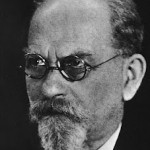Key ideas: Applebaum on the phenomenological reduction
Sep 3rd, 2012 | By Marc Applebaum | Category: Merleau-PontyI recently posted a short discussion of what “the natural attitude” means in Husserl’s phenomenology. As I mentioned, the natural attitude is the perspective of everyday life. For Husserl the process he calls the phenomenological reduction is the means by which the phenomenologist frees himself from the reifications of the natural attitude, gaining a standpoint from which to view and explicate both real (Ger: real) and irreal (Ger: reel) objects, having bracketed their facticity, as presences. The word “reduction” is used philosophically; it doesn’t mean diminishing something, but instead relies upon one of the meanings of reduction’s Latin root: to restore or return something to a more primordial mode.
 Husserl uses the term reduction to signify a specific shift in attitude that can be employed by the researcher in a variety of contexts. Hence Husserl referred to phenomenological, philosophical, psychological, eidetic, transcendental, ethical, and intersubjective reductions (Kockelmans, 1967). Not only is my perception of external objects transformed when I adopt the attitude of the reduction, but likewise my perception of the most intimate of objects: my personal ego. Phenomenology’s reductions reveal not only the phenomenal nature of objects but also, Husserl claimed, transcendental subjectivity and intersubjectivity.
Husserl uses the term reduction to signify a specific shift in attitude that can be employed by the researcher in a variety of contexts. Hence Husserl referred to phenomenological, philosophical, psychological, eidetic, transcendental, ethical, and intersubjective reductions (Kockelmans, 1967). Not only is my perception of external objects transformed when I adopt the attitude of the reduction, but likewise my perception of the most intimate of objects: my personal ego. Phenomenology’s reductions reveal not only the phenomenal nature of objects but also, Husserl claimed, transcendental subjectivity and intersubjectivity.
The researcher “reduces” everyday, empirical reality through use of the phenomenological epoché or “bracketing.” The meaning of ἐποχή is “to hold back” or “to withhold;” in affecting the epoché I withhold my assent to the ontological status of the perceived: I “bracket” its facticity. Spiegelberg (1965) wrote that the reduction is the conscious act in which the:
“General thesis of belief in factual existence characteristic of the natural attitude is inhibited, suspended, bracketed…or turned off, and which uncovers in transcendental subjectivity the acts which constitute pure phenomena.”(p. 724)
Husserl (1982, p. 44) explained the reduction’s rigor in his discussion of the “Principle of all Principles” in the first volume of Ideas: “everything originarily…offered to us in ‘intuition’ is to be accepted simply as what it is presented as being, but also only within the limits in which it is presented there.” Employing the phenomenological reduction I take no position with respect to the ultimate (existential) reality of what I see; instead, I simply witness it just as it presents itself to me, and describe it as such. This instance of the reduction is properly termed the phenomenological reduction because facts are “reduced” to the way they stand out to me as presences. Phenomenology uses the reduction to entirely set aside existential questions and shift from existential affirmation or negation to description. It is a method involving a bracketing or parenthesizing (Einklammerung) of something that had formerly been taken for granted in the natural attitude.
In order, therefore, to examine psychic subjectivity the researcher must perform a phenomenological-psychological reduction, suspending the “taking-for-grantedness” of psychological phenomena. In the psychological reduction, Husserl wrote, “psychic subjectivity, the concretely grasped ‘I’ and ‘we’ of ordinary conversation, is experienced in its pure psychic owness…” (1973, p. 62 in Zaner and Idhe). Gurwitsch (1966) explained that performing the psychological reduction means a shift in attitude toward everything normally perceived as a mundane existent in the life world (Lebenswelt); rather than taking them for granted:
“All persons, including the psychologist himself, inasmuch as they perceive themselves as human beings, hence as mundane existents, are transformed into phenomena, and by the same token disclosed as subjects of intentional conscious life.” (p. 443)
This particular reduction reduction (as has been noted, there are many kinds of reductions for Husserl) leads the researcherto recognize his or her embeddedness in intersubjectivity. Husserl claimed that when one examines the phenomenal ground of what it means to be an “I,” one discovers that it is impossible to have a sense of “I-ness” without an  accompanying sense and expectation of “you-ness”—indeed, at the core of the sense of “I” there is the experience of a plurality of “you’s”—what Husserl termed “co-subjectivity” (Mitsubjectivität).
accompanying sense and expectation of “you-ness”—indeed, at the core of the sense of “I” there is the experience of a plurality of “you’s”—what Husserl termed “co-subjectivity” (Mitsubjectivität).
Moreover, I immediately recognize others as similar to myself, i.e. they are not just objects, they are subjects like myself, and the world I live in is a world of commonly (intersubjectively) recognizable people, places, and things. Gurwitsch (1966) summarized Husserl’s view of intersubjectivity by stating that:
“Performing the [psychological] reduction upon himself, the psychologist, in analyzing his own conscious life, becomes aware of its relationship to and connectedness with, the conscious life of other persons…in his very experience of himself as human being are implied references to other human beings, to an open horizon of humanity…and co-subjectivity (Mitsubjectivität). Experience of oneself proves to be inseparable from that of others.” (p. 443)
This collectivity is an open horizon of transcendental subjects, that is, subjects whose conscious acts (noesis) transcend the factual objects of experience. Since, Husserl argued, the co-subjectivity of transcendental others is an indispensable constituent of the life world, he concludes that the life world is a field of transcendental intersubjectivity. These insights are close to the foundation of the phenonomenological study of empathy by Scheler, Husserl, and Stein, a topic Zahavi (2010) has recently explored.
Therefore the primacy of one’s ego-pole in experience is not absolute: that is to say, there is never, from Husserl’s standpoint, the experience of a solus ipse. An ego utterly detached and unrelated to others is not even strictly speaking imaginable, in Husserl’s view, if we are true to the essential structure of what it means to be an “I,” namely to be always located in an intersubjective field. This intersubjectivity can be experienced empirically as the world of other people in their concreteness, psychologically-phenomenally, as the world of other psychological consciousnesses, or transcendentally, as the world of other transcendental subjects. Transcendental intersubjectivity, Gurwitsch (1966) wrote, is:
“The community of ego-poles to which my own ego-pole also belongs, though it enjoys a privileged position, since it remains forever the ego-pole with respect to which every other ego-pole appears as an alter ego-pole.” (p. 435)
It is in this context that Husserl spoke of a “transcendental reduction” or an “intersubjective reduction.” For Husserl transcendental subjectivity, always embedded in intersubjectivity, constitutes and bestows sense to the psychological and natural domains (Gurwitsch, 1966 p. 111). Therefore transcendental subjectivity “can be called the primal basis for all legitimacy and validity…” (Ibid. p. 111). Consequently it is the transcendental reduction that differentiates phenomenology decisively from every other kind of psychology.
References
Gurwitsch, A. (1966). Studies in phenomenology and psychology. Evanston: Northwestern University Press.
Husserl, E. (1973). Phenomenology. In R. M. Zaner and D. Ihde, Phenomenology and existentialism. (pp. 46-70). New York: G. P. Putnam’s Sons.
Husserl, E. (1982). Ideas pertaining to a pure phenomenology and to a phenomenological philosophy: First book, General introduction to a pure phenomenology. (F. Kersten, Trans.). Boston: Kluwer Academic Publishers.
Kockelmans, J. (1967). A first introduction to Husserl’s phenomenology. Louvain: Duquesne University Press.
Spiegelberg, H. (1965). The phenomenological movement: A historical introduction. (2 Vols.) The Hague: Martinus Nijhoff.
Zahavi, D. (2010). Empathy, embodiment, and interpersonal understanding: Empathy from Lipps to Schutz. Inquiry 55 (3), 285-306.
photo credit, trees in the water:Denis Collette…!!! via photo pin cc
 Follow
Follow email
email
Hi! a wonderful post indeed which made me understand phenomenology at least to some limited extent! the word phenomenology has been used quite casually, and its wonderful to be introduced to the real meaning of it.
By way of introduction, am a medical professional and have been interested in studying aspects of medicine with a view to gain deeper understanding of the phenomena therein. Was hoping to possibly discuss/collaborate with you. Please do let me know, cheers.